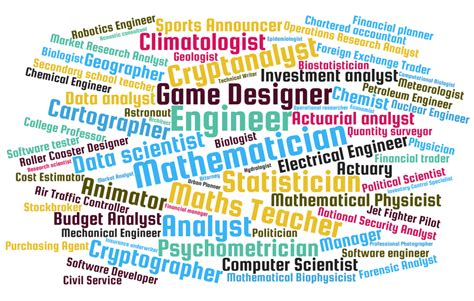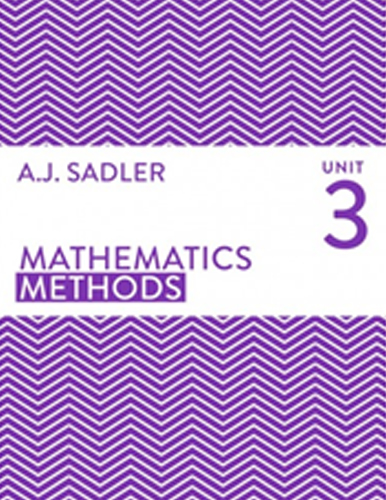Math Careers

The field of mathematics is vast and diverse, offering a plethora of exciting career paths for individuals with a passion for numbers and logical reasoning. From traditional roles in academia and research to innovative opportunities in technology and finance, a math career can be both intellectually stimulating and rewarding. This article aims to explore the various avenues available to mathematics enthusiasts, highlighting the skills, qualifications, and potential paths to success in this dynamic field.
Academic and Research Opportunities

For those with a deep-rooted love for theoretical mathematics, an academic career path can be immensely fulfilling. University professors and researchers contribute to the advancement of mathematical knowledge, often specializing in areas such as algebra, geometry, topology, or statistics. These roles typically require a strong educational background, with a Ph.D. in Mathematics being the standard qualification.
Academic mathematicians conduct research, publish papers in peer-reviewed journals, and contribute to the mathematical community through conferences and seminars. They may also teach undergraduate and graduate courses, mentor students, and guide them through their own research projects. The academic world provides an environment where curiosity and intellectual exploration thrive, making it an ideal choice for individuals passionate about delving into the intricacies of mathematics.
Research Specializations
The field of mathematics is vast, offering a multitude of research specializations. Here are a few examples:
- Number Theory: Focusing on the properties and relationships of numbers, this specialization explores prime numbers, algebraic structures, and number-theoretic algorithms.
- Applied Mathematics: Combining mathematical theory with real-world applications, this field includes areas like fluid dynamics, optimization, and mathematical modeling for various industries.
- Mathematical Physics: At the intersection of mathematics and physics, researchers in this field study topics like quantum mechanics, general relativity, and mathematical models of physical phenomena.
- Cryptography: With a focus on secure communication and data protection, mathematicians in cryptography develop encryption algorithms and secure protocols for digital systems.
- Financial Mathematics: This specialization applies mathematical principles to financial markets, derivatives, and risk management, playing a crucial role in the global financial industry.
Industry Careers: Applying Mathematics

Mathematics is an integral part of many industries, and its practical applications offer a wide range of career opportunities. Here’s an overview of some key industries and the roles mathematicians play within them.
Technology and Data Science
The tech industry relies heavily on mathematical expertise. Data scientists, machine learning engineers, and software developers all utilize mathematical skills to analyze data, develop algorithms, and create innovative technologies. For instance, machine learning algorithms, powered by mathematical models, are at the core of many cutting-edge technologies like facial recognition, natural language processing, and autonomous vehicles.
In the realm of data science, mathematicians contribute to data analysis, visualization, and interpretation. They work with large datasets, employing statistical methods and machine learning techniques to extract valuable insights and inform business decisions. With the ever-growing volume of data, the demand for skilled mathematicians in data science roles is on the rise.
| Industry | Mathematics Applications |
|---|---|
| Technology | Machine Learning, Data Analytics, Software Development |
| Finance | Risk Management, Quantitative Analysis, Algorithmic Trading |
| Healthcare | Medical Imaging Analysis, Clinical Trial Design, Epidemiology |
| Engineering | Structural Analysis, Optimization, Control Systems |

Finance and Economics
The financial industry has long been a hub for mathematicians. Quantitative analysts, often known as quants, develop complex models to assess investment risks, design financial products, and optimize trading strategies. Economists, on the other hand, utilize mathematical and statistical methods to study economic trends, forecast market behavior, and advise on monetary policies.
Within the finance sector, mathematicians also play a crucial role in risk management, ensuring that financial institutions have robust strategies to mitigate potential losses. Their mathematical expertise is instrumental in developing and maintaining risk models, stress testing scenarios, and regulatory compliance.
Healthcare and Life Sciences
Mathematics is a vital tool in healthcare and life sciences. Biostatisticians, for example, apply mathematical and statistical methods to analyze medical data, design clinical trials, and interpret research results. In the field of medical imaging, mathematicians develop algorithms to enhance image quality and enable early disease detection.
Additionally, mathematical modeling is used in epidemiology to study the spread of diseases, optimize healthcare resource allocation, and inform public health policies. The healthcare industry relies on the precision and analytical power of mathematics to improve patient outcomes and advance medical research.
The Skills and Qualifications for a Math Career
Success in a mathematics career often hinges on a combination of strong academic credentials and a set of transferable skills. Here’s an overview of the key qualifications and skills needed to thrive in various math-related professions.
Educational Background
A solid foundation in mathematics is essential. For many academic and research roles, a Ph.D. in Mathematics is the standard qualification. However, for industry careers, a bachelor’s or master’s degree in Mathematics, Computer Science, or a related field can be sufficient, depending on the specific role and industry.
Technical Skills
- Advanced Mathematics: Proficiency in areas such as calculus, linear algebra, differential equations, and statistical analysis is crucial for many math careers.
- Programming Languages: Proficiency in programming languages like Python, R, or Java is often required, especially for data-intensive roles in technology and finance.
- Data Analysis: The ability to work with large datasets, employ statistical techniques, and interpret data is essential for many math-related jobs.
- Mathematical Modeling: The skill to develop and apply mathematical models to real-world problems is valuable across industries.
Soft Skills
- Critical Thinking: The ability to analyze complex problems, identify underlying principles, and develop innovative solutions is vital.
- Communication: Effective communication, both written and verbal, is essential for explaining complex mathematical concepts to colleagues and clients.
- Teamwork: Many math careers involve collaboration with diverse teams, requiring strong interpersonal skills and the ability to work effectively with others.
- Adaptability: The ability to adapt to changing technologies, methodologies, and industry trends is crucial for long-term success.
The Future of Math Careers
The field of mathematics is ever-evolving, and the future holds exciting prospects for those pursuing a career in this domain. With the increasing reliance on data-driven decision-making and the continued development of innovative technologies, the demand for skilled mathematicians is set to grow across industries.
Artificial Intelligence and Machine Learning
The rapid advancement of Artificial Intelligence (AI) and Machine Learning (ML) technologies has created a new wave of opportunities for mathematicians. These fields heavily rely on mathematical foundations, and mathematicians play a crucial role in developing and refining AI algorithms, training neural networks, and ensuring the ethical and responsible use of these technologies.
Quantitative Finance and Risk Management
In the financial sector, the need for mathematicians with expertise in quantitative analysis and risk management is expected to increase. With the growing complexity of financial markets and the need for more sophisticated risk assessment models, mathematicians will continue to be in high demand to ensure the stability and resilience of financial institutions.
Healthcare and Biomedical Research
The healthcare industry is increasingly turning to mathematics to improve patient care and advance medical research. Mathematicians are contributing to the development of personalized medicine, optimizing healthcare delivery systems, and enhancing medical imaging technologies. The intersection of mathematics and healthcare is a rapidly growing field, offering unique career opportunities.
Conclusion

A career in mathematics offers a world of possibilities, from the theoretical realms of academia to the practical applications in industry. Whether one chooses to delve into the depths of mathematical research or apply mathematical principles to solve real-world problems, the journey is both challenging and rewarding. With a strong foundation in mathematics, a set of transferable skills, and a passion for logical reasoning, individuals can carve out successful and impactful careers in this dynamic field.
What are the average salaries for math-related careers?
+Salaries in math-related careers can vary widely depending on factors such as industry, job role, and geographic location. On average, mathematicians and statisticians earn around 90,000 annually, while data scientists and quantitative analysts can earn upwards of 100,000. Academic mathematicians and professors may have lower starting salaries but can earn significantly more with tenure and increased research opportunities.
What are the job prospects for math graduates?
+The job prospects for math graduates are excellent. With a strong foundation in mathematics, graduates can pursue a wide range of careers in academia, research, technology, finance, and more. The demand for skilled mathematicians is high, especially in data-driven industries. A math degree opens doors to various opportunities, allowing individuals to choose a path that aligns with their interests and career goals.
How can I prepare for a career in mathematics?
+To prepare for a career in mathematics, it’s essential to build a strong foundation in mathematical concepts. Take a variety of math courses, from calculus to linear algebra, and consider participating in math competitions or projects to enhance your skills. Developing programming and data analysis abilities is also beneficial, especially for industry roles. Networking with professionals in your desired field and gaining relevant work experience through internships can also greatly improve your career prospects.



